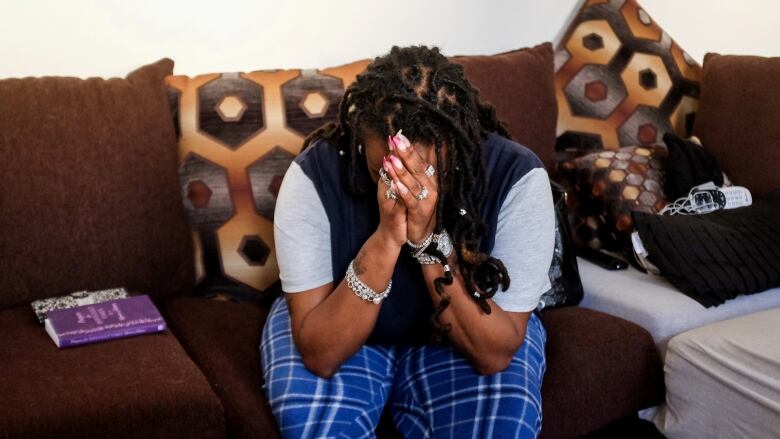Range of emotions normal at this point in pandemic, UW psychologist says

The weather is warming up, brighter days are ahead with more people being vaccinated, yet with the province's stay-at-home order in place until June 2, it has some people feeling sad, angry or just, blah.
Registered psychologist and University of Waterloo professor Christine Purdon joined CBC K-W's The Morning Edition host Craig Norris to talk about those feelings. She says many of them are normal right now, but there are some things people should watch for as they go about their day.
The following interview has been edited for length and clarity. You can listen to full the interview at the bottom of this article.
Craig Norris: We've heard people say that they're trying to get more sleep. They may even be napping, but they never feel completely rested. Is that unusual?
Christine Purdon: I don't think it's unusual. I think our circumstances are very stressful and I think it's normal to feel stressed when things are stressful. And I think people have a lot on their plate.
They're trying to juggle so many different roles. There's so much unpredictability. There's just so much constant planning and then planning and then planning again, because everything's changing. It's just a shifting landscape.
I think people are pretty tired.
CN:Related to that, COVID-19 has disproportionately impacted women. It's been a relentless grind for people who work full time at home, but they're also managing their child's care and the child's education. What can they do to maybe find some relief?
CP: The pandemic has really highlighted all the inequities in our society. So I think anybody who's racialized, minoritized people, you know, this disproportionately affects these people.
So women, for whatever reason, continue to be the ones who take on a disproportionate share of child care. There are also many women trying to work full-time while they're also doing that. And, yes, it is a relentless grind.
One of the things that we can do to ourselves is feel responsible, so the women may be feeling like, I'm not doing as well at my work and I'm not doing as well, I'm letting my children down. And I think that part is really important, to try to step back and say, "OK, I'm doing the best I can. And the circumstances are making it very difficult for me to meet the goals that I would like to meet."
I think the second thing is that all the support people in people's lives need to step in and say, what can I do to help relieve that burden? In fact, I was saying on Mother's Day, that would be kind of the best Mother's Day present ... for people to step in and say, "OK, what can I do to permanently take something off this person's plate?"

CN: What can people do if, at this point they're feeling irritated or they're feeling angry about the extended stay-at-home order?
CP: Yeah, I think that's normal. I think a lot of people are very angry about that.
I think this is where acceptance has to come in. And that doesn't mean like or condone, and it doesn't mean that we don't agitate for change in the government like for better policies or whatever it is that we're angry about.
But what it does mean is that we recognize there's only so much we can change and that if we just move into just being angry, we're going to exhaust ourselves and we're not going to be able to enjoy the small pleasures that are available to us. And we'll be better off at the end of the day if we figure out constructive ways to channel our anger and don't be all about the anger, just try to try to find what we can do, focus on what we can do. And as you said, the days are getting longer. The weather's lovely. We can be outside of it and focus on those sorts of things.
CN: A real buzzword these days, ever since I think New York Times [reported on it], is languishing. How do we spot languishing and what can we do about it?
CP:We tend to think of a low mood is sort of actively down. But languishing is, in some ways, more insidious because it's not as much of an adverse state and so we just kind of settle into it.
I think that we want to notice if we're not experiencing joy that we normally would. So when our children present us with a lovely drawing or our dog does something cute and we're not joyful about that, I think that's an indication of languishing.
And I think that means that we need to take a mental step backwards and say, wait, I need to engage with life. I know I feel very helpless right now, but I've got to find a way to engage with life.
CN: We don't know if children will get back to school next month. We hear over and over that, you know, kids are resilient. They bounce back. What should we watch for in kids that signals they aren't OK?
CP: I think for kids, I think looking for languishing in them ... and not really engaged is an important thing to be on the lookout for.
I think we're just not going to know until the end of this where kids are going to be out and what we need ... it's an absolute imperative to pour resources into helping kids who really need structure.
There are some kids, you could put them on a desert island and they'll learn. Other kids need a lot more structure.
The kids who have not had good access to resources throughout this whole process, who may be more at risk, I think we need to be prepared to really do what we can to help those kids catch up. But I think right now we can only do the best we can and we just don't know what resilience factors our kids are going to have and how those are going to play out until they're back learning again in the classroom.
But I do think catching the languishing in your kids is important and finding ways to help them engage is an important step.
Listen to the full audio below:












_(720p).jpg)


 OFFICIAL HD MUSIC VIDEO.jpg)
.jpg)



























































































